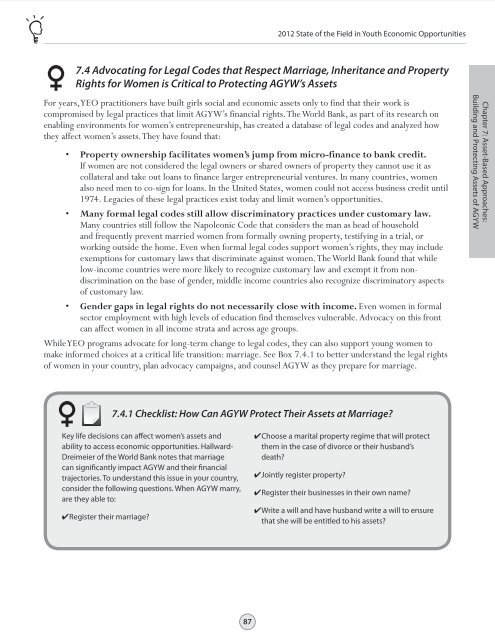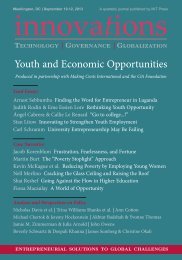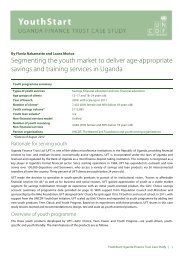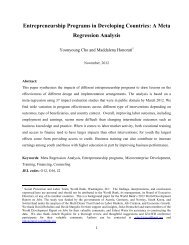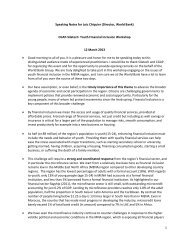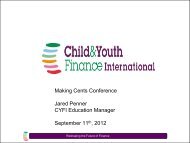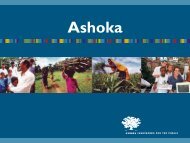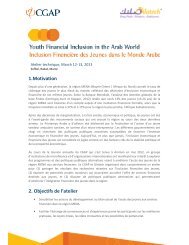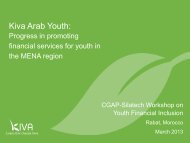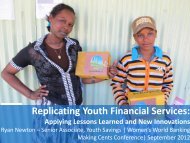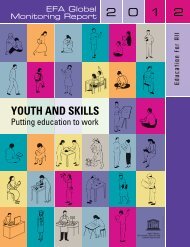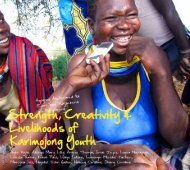STATE OF THE FIELD IN YOUTH ECONOMIC OPPORTUNITIES
STATE OF THE FIELD IN YOUTH ECONOMIC OPPORTUNITIES
STATE OF THE FIELD IN YOUTH ECONOMIC OPPORTUNITIES
Create successful ePaper yourself
Turn your PDF publications into a flip-book with our unique Google optimized e-Paper software.
Table of Contents<br />
Chapter 9<br />
Chapter 1 Chapter 2 Chapter 3 Chapter 4 Chapter 5 Chapter 6 Chapter 7 Chapter 8<br />
Chapter 10 Chapter 11 Chapter 12 Chapter 13 Chapter 14 Chapter 15 Annexes<br />
2012 State of the Field in Youth Economic Opportunities<br />
7.4 Advocating for Legal Codes that Respect Marriage, Inheritance and Property<br />
Rights for Women is Critical to Protecting AGYW’s Assets<br />
For years, YEO practitioners have built girls social and economic assets only to find that their work is<br />
compromised by legal practices that limit AGYW’s financial rights. The World Bank, as part of its research on<br />
enabling environments for women’s entrepreneurship, has created a database of legal codes and analyzed how<br />
they affect women’s assets. They have found that:<br />
• Property ownership facilitates women’s jump from micro-finance to bank credit.<br />
If women are not considered the legal owners or shared owners of property they cannot use it as<br />
collateral and take out loans to finance larger entrepreneurial ventures. In many countries, women<br />
also need men to co-sign for loans. In the United States, women could not access business credit until<br />
1974. Legacies of these legal practices exist today and limit women’s opportunities.<br />
• Many formal legal codes still allow discriminatory practices under customary law.<br />
Many countries still follow the Napoleonic Code that considers the man as head of household<br />
and frequently prevent married women from formally owning property, testifying in a trial, or<br />
working outside the home. Even when formal legal codes support women’s rights, they may include<br />
exemptions for customary laws that discriminate against women. The World Bank found that while<br />
low-income countries were more likely to recognize customary law and exempt it from nondiscrimination<br />
on the base of gender, middle income countries also recognize discriminatory aspects<br />
of customary law.<br />
• Gender gaps in legal rights do not necessarily close with income. Even women in formal<br />
sector employment with high levels of education find themselves vulnerable. Advocacy on this front<br />
can affect women in all income strata and across age groups.<br />
While YEO programs advocate for long-term change to legal codes, they can also support young women to<br />
make informed choices at a critical life transition: marriage. See Box 7.4.1 to better understand the legal rights<br />
of women in your country, plan advocacy campaigns, and counsel AGYW as they prepare for marriage.<br />
Chapter 7: Asset-Based Approaches:<br />
Building and Protecting Assets of AGYW<br />
7.4.1 Checklist: How Can AGYW Protect Their Assets at Marriage<br />
Key life decisions can affect women’s assets and<br />
ability to access economic opportunities. Hallward-<br />
Dreimeier of the World Bank notes that marriage<br />
can significantly impact AGYW and their financial<br />
trajectories. To understand this issue in your country,<br />
consider the following questions. When AGYW marry,<br />
are they able to:<br />
✔ Register their marriage<br />
✔ Choose a marital property regime that will protect<br />
them in the case of divorce or their husband’s<br />
death<br />
✔ Jointly register property<br />
✔ Register their businesses in their own name<br />
✔ Write a will and have husband write a will to ensure<br />
that she will be entitled to his assets<br />
87


